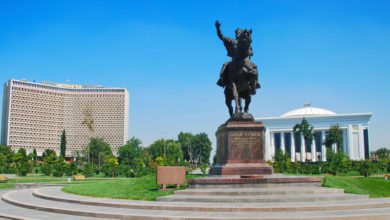Central Asia & Caucasus
Coronavirus economics watch: Central Asia and the Caucasus

Eurasianet – A new digest on how the pandemic is plundering Eurasia’s economies
ARMENIA
- Schools will reopen on September 15, RFE/RL reported on August 11.
- The State Revenue Committee said on August 3 that the government has spent 2.6 billion drams ($5.4 million) supporting 12,857 small businesses thus far during the pandemic.
- When Armenia ended its coronavirus lockdown in early May, even as the epidemic’s spread was accelerating, the government cited the need to keep the economy going and let people get back to work. Nearly three months on, the economy has continued to suffer, we reported on July 30.
- Armenia’s Central Bank reaffirmed its prediction that the economy will contract 4 percent this year, Radio Azatutyun reported on July 28.
AZERBAIJAN
- President Ilham Aliyev, nodding to the unfolding economic crisis, called on August 6 for state companies to be privatized, blasting the “socialist economic model” he has overseen for 17 years.
- Azerbaijan has adjusted its budget to reflect lower oil prices – $35 a barrel rather than $55 – Finance Minister Samir Sharifov said on August 5 in comments carried by Azadliq. The fall in GDP is unlikely to exceed 5 percent this year, Sharifov added.
- The Economy Ministry announced on August 5 a second phase of payroll support to businesses that have not laid off a “significant” number of employees.
- Downward pressure is easing on the Azerbaijani manat, though Baku remains highly dependent on oil and gas sales, which account for roughly 40 percent of GDP, 81 percent of export revenues, and two-thirds of the government budget, Fitch Ratings said on July 17. “Azerbaijan’s very strong external balance sheet is absorbing most of the impact from lower oil prices,” Fitch said in its negative outlook, but “lack of predictability and transparency of policy-making exacerbates the risk of policy missteps.”
- Income from Azerbaijan’s oil exports fell 30 percent year-on-year in the first half of 2020, Turan reported on July 17. Non-oil exports decreased by 6.9 percent.
- Oil workers on offshore platforms have been told to take pay cuts or be sacked, OC Media reported on July 2. Some workers report they have not been paid in months.
GEORGIA
- Georgia is one of eight countries to receive European Commission support financing its external debts during the pandemic, the Commission announced on August 11. Conditions for the 150 million euro loan “relate to strengthening public finance management, improving governance, sector reforms, and labour market policies.”
- The German government will loan Tbilisi 310 million euros ($365 million), Civil.ge reported on August 8. 180 million euros are intended to help fight economic fallout from the pandemic; the other 130 million euros are earmarked for infrastructure projects.
- Schools will reopen on September 15, the government announced on August 5.
- The National Bank has revised downward its GDP estimate for 2020 to negative 5 percent, Interpress reported on August 5; officials previously predicted output to fall 4 percent.
- Food prices rose in July at an annual rate of 11.5 percent, contributing to an annualized inflation rate of 5.7 percent, the National Statistic Office said on August 3. Transport prices fell.
- Real GDP shrank 5.8 percent in the first six months of 2020 compared to the same period last year, the National Statistics Office said on July 31. In June, the year-on-year decline was 7.7 percent, an improvement over the 13.5 percent decline in May and the 16.6 percent contraction in April.
- The average household in Georgia has seen its income fall 40 percent since the pandemic began, OC-Media reported, citing a study released in late July.
- Lufthansa resumed flights to Georgia on August 3, Agenda.ge reported. With the exception of flights from Paris, Munich and possibly Riga, Georgia will not allow international flights to land in the country until at least August 31, Agenda.ge reported on July 22. The EU has allowed Georgian citizens to resume visits since July 1.
- Georgia’s foreign trade turnover decreased by 18.2 percent in the first half of 2020 compared to the same period last year, Civil.ge reported on July 20. Turkey remains the country’s largest trading partner, followed by Russia.
- Georgia is considering opening its borders to foreigners who wish to work remotely from the South Caucasus, Interpress reported on July 16. Applicants would need to commit to living in Georgia for six months and subject themselves to a 14-day quarantine upon arrival.
KAZAKHSTAN
- Authorities will allow some international flights to resume on August 17, Tengri reported on August 12. Approved destinations include the United Arab Emirates, Belarus, Germany, the Netherlands, Egypt, Ukraine and Russia.
- GDP declined 2.9 percent in the first six months of 2020, the government said on August 11. At 7.1 percent, inflation was slightly below expectations.
- The Ministry of Labor and Social Protection said that 2.5 million Kazakhstanis have applied for government assistance to help with job loss related to the pandemic since the second lockdown began last month. 2.3 million received the 42,000 tenge ($100) payment, Inform.kz reported on August 11.
- A healthcare worker in Almaty admitted to police that she sold 12 negative coronavirus test certificates for about $60 apiece, Mediazona reported on August 6. Corruption in the medical industry is considered common because of low salaries.
- Most children will study remotely when the school year starts on September 1, the Education Minister said on August 4.
- The World Bank expects Kazakhstan’s economy to contract by 3 percent this year, it said in a July 22 report: “Preliminary estimates suggest that the poverty rate may rise in 2020 from a projected 8.3 to 12.7 percent – equating to more than 800,000 additional people living in poverty.”
KYRGYZSTAN
- International donors have provided $333 million to Kyrgyzstan to help fight coronavirus, the deputy finance minister said on August 5. $260 million was received in the form of budget support.
- Kyrgyzstan has negotiated debt extensions with most of its creditors, but not yet with China, which owns almost half of the debt, Rossiyskaya Gazeta reported on August 5. In total, Kyrgyzstan expects to owe $4.2 billion at the end of the year, Finance Minister Baktygul Zheenbaeva said.
- During a visit to an infectious diseases hospital in Issyk-Kul region on August 4, President Sooronbai Jeenbekov said the government would raise money to increase doctors’ salaries by bringing more of the economy out of the shadows – a Sisyphean task successive governments have struggled to implement for years. The highest paid doctors in Kyrgyzstan receive $169 per month, which is less than the average monthly wage in the country. Salaries for new doctors start at $52 per month.
- The Financial Police have begun raiding pharmacies as they investigate reports of artificial drug shortages and overpricing, Kloop reported on July 24.
TAJIKISTAN
- Workers at Tajikistan’s largest factory and largest industrial project say they have not been paid in months, Asia-Plus reported on August 6. TALCO, the aluminum factory that has long enriched the president’s family, and Rogun, intended to be the world’s tallest hydropower dam, are not responding to journalists’ questions.
- Schools will reopen on August 17, earlier than normal to allow students to make up for time lost in the spring, Asia-Plus reported on August 5.
- A year-long pandemic-induced crisis would see remittances to Central Asia fall by $3.4 billion this year, or about 24 percent, the Asian Development Bank said on August 3. Russia, the largest source of remittances for the region, is experiencing a sharp economic decline due to coronavirus as well as low oil prices. Last year, Tajikistan and Kyrgyzstan received the equivalent of about 30 percent of GDP in the form of cash transfers from laborers abroad.
- Remittances from Russia in the first half of 2020 decreased 15 percent year-on-year, the chairman of the National Bank said in a July 22 briefing short on details. Tajikistan’s economy is perilously reliant on remittances. In 2019, those payments amounted to around $2.5 billion, which is equivalent to around one-third of GDP.
- Tajikistan’s external debt grew by $170.9 million in the first half of 2020 to $3.1 billion, the finance minister told journalists on July 29, putting the country’s ratio of external debt to GDP at 36.1 percent. The vast majority, $1.1. billion, is owed to China’s Eximbank.
- The number of migrants departing for work abroad fell 57 percent in the first half of 2020 compared to the same period of 2019, the government said on July 23, Asia-Plus reported.
TURKMENISTAN
- State employees in the Lebap province, including workers at state-owned factories and teachers, have been sent on unpaid leave for three months, Central Asia Media reported on August 6.
- The pandemic is forcing the government to put its long-term industrial plans on hold. The most notable among these being the trans-Afghan TAPI natural gas pipeline. This much was admitted on July 27, during a video-conference meeting of representatives from project participant nations. One conclusion reached during that exchange was that work would be “activated” once the pandemic is over. Since Turkmenistan is so mysterious about its own health crisis, however, it is difficult to understand how anybody will know when and if that has happened.
- Authorities in Ashgabat have begun removing ATMs to prevent crowding, exile-run Turkmen News reported on July 22, making it impossible for people to withdraw their salaries, pensions and child benefits.
UZBEKISTAN
- The World Bank estimates another half million Uzbekistan citizens will be pushed below the poverty line during the pandemic, Podrobno reported on August 12.
- Government employees with the state sanitary and epidemiological service in five provinces have embezzled 1.75 billion sum ($171,000) from coronavirus relief funds, Senate Speaker Tanzila Narbaeva said on August 7. But a man who called for more transparency in the distribution of foreign aid was called for questioning by the security services, we reported on August 10.
- More than 500 Uzbek migrant workers trying to get home are stuck on the Russian-Kazakh border, unable to cross due to COVID-related restrictions, Central Asia Media reported on August 4. Russian media have reported clashes with Russian riot police.
- The Asian Development Bank announced a $100 million loan to Uzbekistan to help the country strengthen its heath system and effectively respond to the pandemic, the lender said on August 3. Uzbekistan has received over $1 billion in loans to fight coronavirus so far in 2020 from three multilateral development banks, the Finance Ministry announced on July 28: the World Bank, the International Monetary Fund, and the Asian Development Bank.
- The price of a sheep has risen about 67 percent in one year, according to a calculation by local journalists on the Kurban Khayit (Eid al-Adha) holiday, when families with the means are encouraged to sacrifice a sheep. Podrobno.uz reminded readers that the sheep must be purchased with money earned honestly.





